Kevin K. Bowden
Athena 2.0: Discourse and User Modeling in Open Domain Dialogue
Aug 03, 2023



Abstract:Conversational agents are consistently growing in popularity and many people interact with them every day. While many conversational agents act as personal assistants, they can have many different goals. Some are task-oriented, such as providing customer support for a bank or making a reservation. Others are designed to be empathetic and to form emotional connections with the user. The Alexa Prize Challenge aims to create a socialbot, which allows the user to engage in coherent conversations, on a range of popular topics that will interest the user. Here we describe Athena 2.0, UCSC's conversational agent for Amazon's Socialbot Grand Challenge 4. Athena 2.0 utilizes a novel knowledge-grounded discourse model that tracks the entity links that Athena introduces into the dialogue, and uses them to constrain named-entity recognition and linking, and coreference resolution. Athena 2.0 also relies on a user model to personalize topic selection and other aspects of the conversation to individual users.
Let's Get Personal: Personal Questions Improve SocialBot Performance in the Alexa Prize
Mar 09, 2023Abstract:There has been an increased focus on creating conversational open-domain dialogue systems in the spoken dialogue community. Unlike traditional dialogue systems, these conversational systems cannot assume any specific information need or domain restrictions, i.e., the only inherent goal is to converse with the user on an unknown set of topics. While massive improvements in Natural Language Understanding (NLU) and the growth of available knowledge resources can partially support a robust conversation, these conversations generally lack the rapport between two humans that know each other. We developed a robust open-domain conversational system, Athena, that real Amazon Echo users access and evaluate at scale in the context of the Alexa Prize competition. We experiment with methods intended to increase intimacy between Athena and the user by heuristically developing a rule-based user model that personalizes both the current and subsequent conversations and evaluating specific personal opinion question strategies in A/B studies. Our results show a statistically significant positive impact on perceived conversation quality and length when employing these strategies.
Athena 2.0: Contextualized Dialogue Management for an Alexa Prize SocialBot
Nov 03, 2021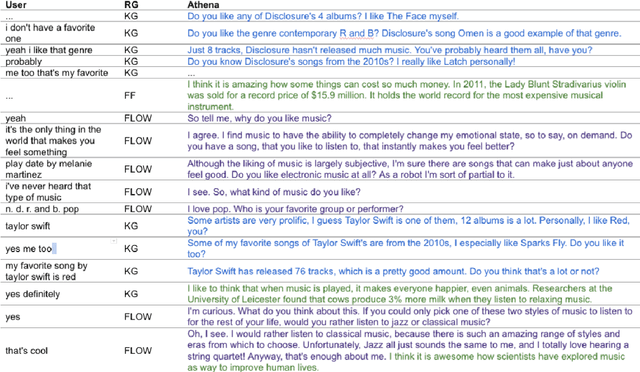
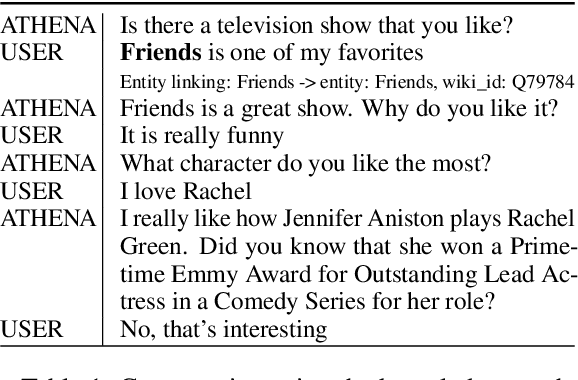
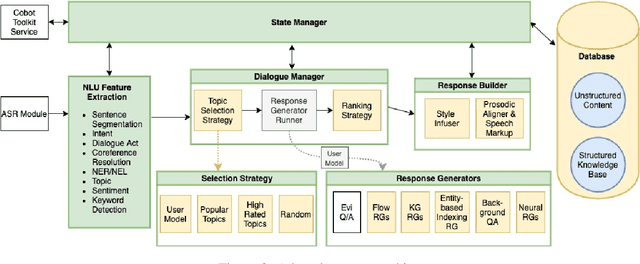
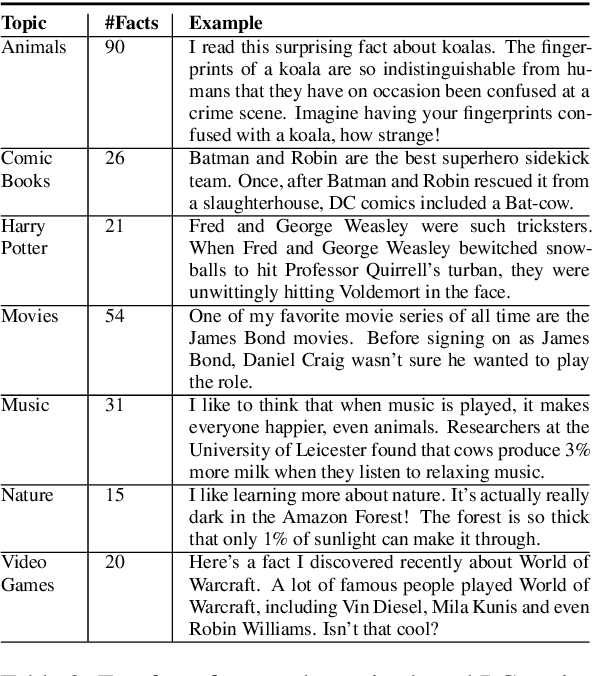
Abstract:Athena 2.0 is an Alexa Prize SocialBot that has been a finalist in the last two Alexa Prize Grand Challenges. One reason for Athena's success is its novel dialogue management strategy, which allows it to dynamically construct dialogues and responses from component modules, leading to novel conversations with every interaction. Here we describe Athena's system design and performance in the Alexa Prize during the 20/21 competition. A live demo of Athena as well as video recordings will provoke discussion on the state of the art in conversational AI.
Athena: Constructing Dialogues Dynamically with Discourse Constraints
Nov 21, 2020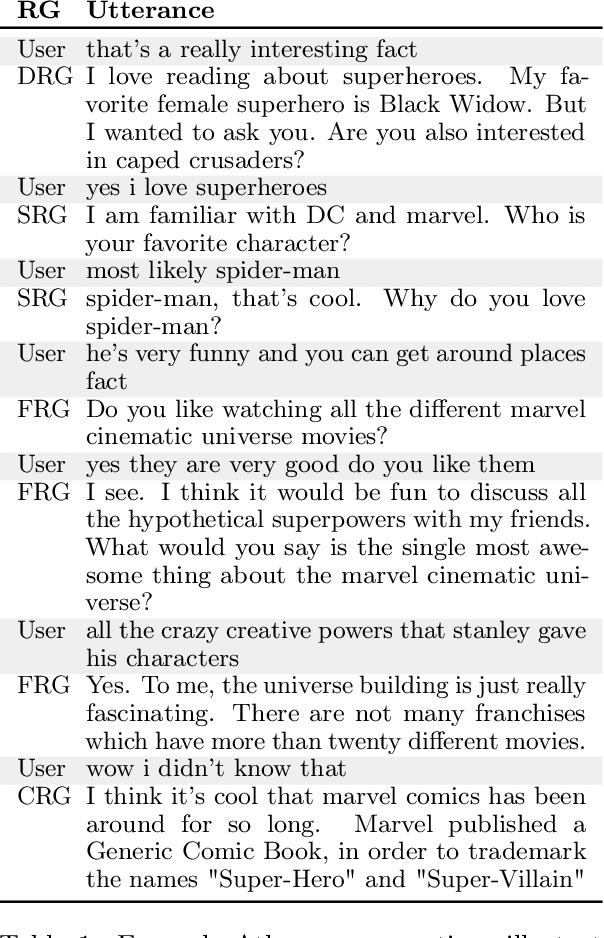
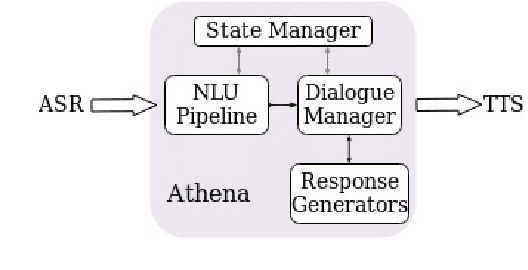

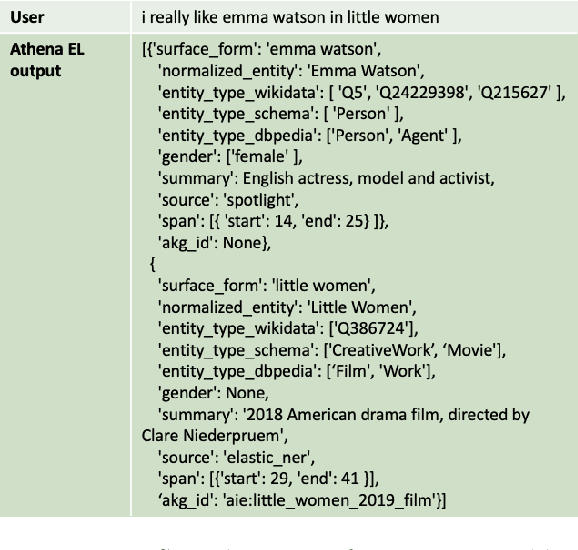
Abstract:This report describes Athena, a dialogue system for spoken conversation on popular topics and current events. We develop a flexible topic-agnostic approach to dialogue management that dynamically configures dialogue based on general principles of entity and topic coherence. Athena's dialogue manager uses a contract-based method where discourse constraints are dispatched to clusters of response generators. This allows Athena to procure responses from dynamic sources, such as knowledge graph traversals and feature-based on-the-fly response retrieval methods. After describing the dialogue system architecture, we perform an analysis of conversations that Athena participated in during the 2019 Alexa Prize Competition. We conclude with a report on several user studies we carried out to better understand how individual user characteristics affect system ratings.
ViGGO: A Video Game Corpus for Data-To-Text Generation in Open-Domain Conversation
Oct 26, 2019



Abstract:The uptake of deep learning in natural language generation (NLG) led to the release of both small and relatively large parallel corpora for training neural models. The existing data-to-text datasets are, however, aimed at task-oriented dialogue systems, and often thus limited in diversity and versatility. They are typically crowdsourced, with much of the noise left in them. Moreover, current neural NLG models do not take full advantage of large training data, and due to their strong generalizing properties produce sentences that look template-like regardless. We therefore present a new corpus of 7K samples, which (1) is clean despite being crowdsourced, (2) has utterances of 9 generalizable and conversational dialogue act types, making it more suitable for open-domain dialogue systems, and (3) explores the domain of video games, which is new to dialogue systems despite having excellent potential for supporting rich conversations.
Entertaining and Opinionated but Too Controlling: A Large-Scale User Study of an Open Domain Alexa Prize System
Aug 13, 2019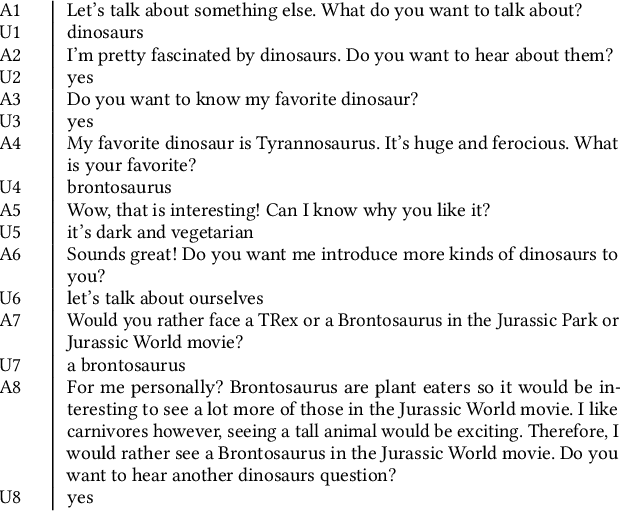
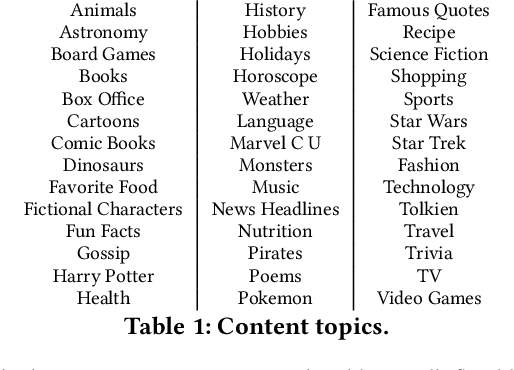

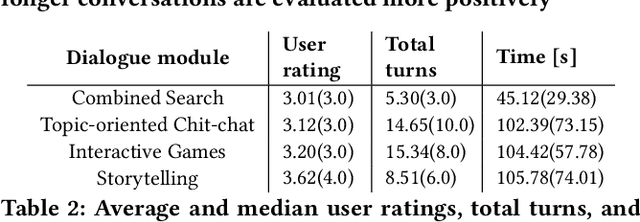
Abstract:Conversational systems typically focus on functional tasks such as scheduling appointments or creating todo lists. Instead we design and evaluate SlugBot (SB), one of 8 semifinalists in the 2018 AlexaPrize, whose goal is to support casual open-domain social inter-action. This novel application requires both broad topic coverage and engaging interactive skills. We developed a new technical approach to meet this demanding situation by crowd-sourcing novel content and introducing playful conversational strategies based on storytelling and games. We collected over 10,000 conversations during August 2018 as part of the Alexa Prize competition. We also conducted an in-lab follow-up qualitative evaluation. Over-all users found SB moderately engaging; conversations averaged 3.6 minutes and involved 26 user turns. However, users reacted very differently to different conversation subtypes. Storytelling and games were evaluated positively; these were seen as entertaining with predictable interactive structure. They also led users to impute personality and intelligence to SB. In contrast, search and general Chit-Chat induced coverage problems; here users found it hard to infer what topics SB could understand, with these conversations seen as being too system-driven. Theoretical and design implications suggest a move away from conversational systems that simply provide factual information. Future systems should be designed to have their own opinions with personal stories to share, and SB provides an example of how we might achieve this.
SlugBot: Developing a Computational Model andFramework of a Novel Dialogue Genre
Jul 22, 2019
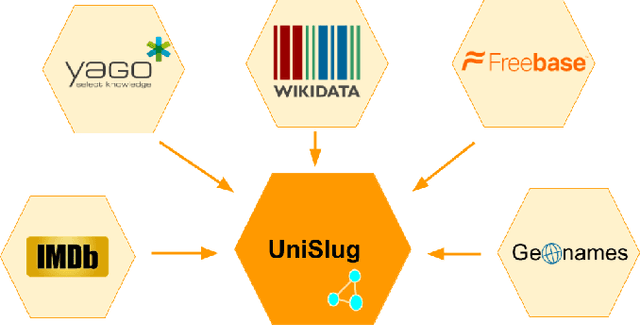
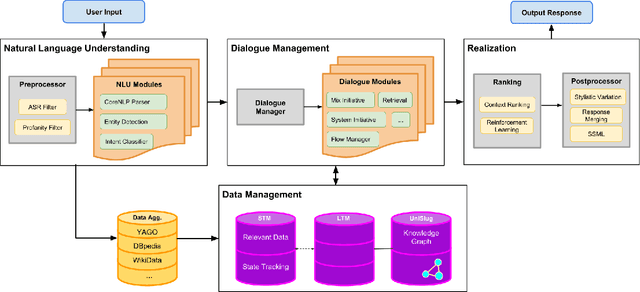

Abstract:One of the most interesting aspects of the Amazon Alexa Prize competition is that the framing of the competition requires the development of new computational models of dialogue and its structure. Traditional computational models of dialogue are of two types: (1) task-oriented dialogue, supported by AI planning models,or simplified planning models consisting of frames with slots to be filled; or (2)search-oriented dialogue where every user turn is treated as a search query that may elaborate and extend current search results. Alexa Prize dialogue systems such as SlugBot must support conversational capabilities that go beyond what these traditional models can do. Moreover, while traditional dialogue systems rely on theoretical computational models, there are no existing computational theories that circumscribe the expected system and user behaviors in the intended conversational genre of the Alexa Prize Bots. This paper describes how UCSC's SlugBot team has combined the development of a novel computational theoretical model, Discourse Relation Dialogue Model, with its implementation in a modular system in order to test and refine it. We highlight how our novel dialogue model has led us to create a novel ontological resource, UniSlug, and how the structure of UniSlug determine show we curate and structure content so that our dialogue manager implements and tests our novel computational dialogue model.
Implicit Discourse Relation Identification for Open-domain Dialogues
Jul 09, 2019


Abstract:Discourse relation identification has been an active area of research for many years, and the challenge of identifying implicit relations remains largely an unsolved task, especially in the context of an open-domain dialogue system. Previous work primarily relies on a corpora of formal text which is inherently non-dialogic, i.e., news and journals. This data however is not suitable to handle the nuances of informal dialogue nor is it capable of navigating the plethora of valid topics present in open-domain dialogue. In this paper, we designed a novel discourse relation identification pipeline specifically tuned for open-domain dialogue systems. We firstly propose a method to automatically extract the implicit discourse relation argument pairs and labels from a dataset of dialogic turns, resulting in a novel corpus of discourse relation pairs; the first of its kind to attempt to identify the discourse relations connecting the dialogic turns in open-domain discourse. Moreover, we have taken the first steps to leverage the dialogue features unique to our task to further improve the identification of such relations by performing feature ablation and incorporating dialogue features to enhance the state-of-the-art model.
A Deep Ensemble Model with Slot Alignment for Sequence-to-Sequence Natural Language Generation
May 16, 2018



Abstract:Natural language generation lies at the core of generative dialogue systems and conversational agents. We describe an ensemble neural language generator, and present several novel methods for data representation and augmentation that yield improved results in our model. We test the model on three datasets in the restaurant, TV and laptop domains, and report both objective and subjective evaluations of our best model. Using a range of automatic metrics, as well as human evaluators, we show that our approach achieves better results than state-of-the-art models on the same datasets.
SlugNERDS: A Named Entity Recognition Tool for Open Domain Dialogue Systems
May 10, 2018



Abstract:In dialogue systems, the tasks of named entity recognition (NER) and named entity linking (NEL) are vital preprocessing steps for understanding user intent, especially in open domain interaction where we cannot rely on domain-specific inference. UCSC's effort as one of the funded teams in the 2017 Amazon Alexa Prize Contest has yielded Slugbot, an open domain social bot, aimed at casual conversation. We discovered several challenges specifically associated with both NER and NEL when building Slugbot, such as that the NE labels are too coarse-grained or the entity types are not linked to a useful ontology. Moreover, we have discovered that traditional approaches do not perform well in our context: even systems designed to operate on tweets or other social media data do not work well in dialogue systems. In this paper, we introduce Slugbot's Named Entity Recognition for dialogue Systems (SlugNERDS), a NER and NEL tool which is optimized to address these issues. We describe two new resources that we are building as part of this work: SlugEntityDB and SchemaActuator. We believe these resources will be useful for the research community.
* Resources can be found: https://nlds.soe.ucsc.edu/node/56
 Add to Chrome
Add to Chrome Add to Firefox
Add to Firefox Add to Edge
Add to Edge